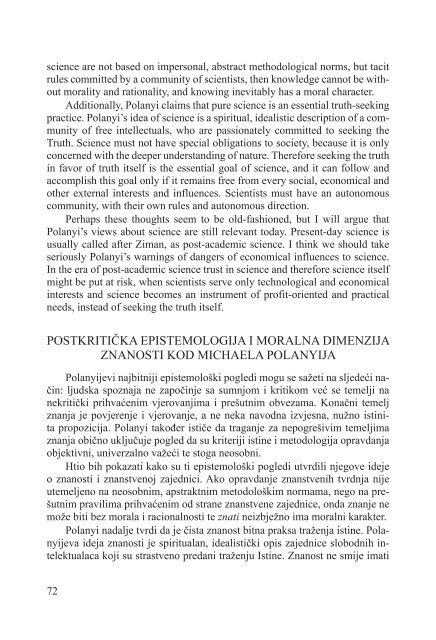Programska knjižica - Hrvatsko filozofsko društvo
Programska knjižica - Hrvatsko filozofsko društvo
Programska knjižica - Hrvatsko filozofsko društvo
You also want an ePaper? Increase the reach of your titles
YUMPU automatically turns print PDFs into web optimized ePapers that Google loves.
science are not based on impersonal, abstract methodological norms, but tacit<br />
rules committed by a community of scientists, then knowledge cannot be without<br />
morality and rationality, and knowing inevitably has a moral character.<br />
Additionally, Polanyi claims that pure science is an essential truth-seeking<br />
practice. Polanyi’s idea of science is a spiritual, idealistic description of a community<br />
of free intellectuals, who are passionately committed to seeking the<br />
Truth. Science must not have special obligations to society, because it is only<br />
concerned with the deeper understanding of nature. Therefore seeking the truth<br />
in favor of truth itself is the essential goal of science, and it can follow and<br />
accomplish this goal only if it remains free from every social, economical and<br />
other external interests and influences. Scientists must have an autonomous<br />
community, with their own rules and autonomous direction.<br />
Perhaps these thoughts seem to be old-fashioned, but I will argue that<br />
Polanyi’s views about science are still relevant today. Present-day science is<br />
usually called after Ziman, as post-academic science. I think we should take<br />
seriously Polanyi’s warnings of dangers of economical influences to science.<br />
In the era of post-academic science trust in science and therefore science itself<br />
might be put at risk, when scientists serve only technological and economical<br />
interests and science becomes an instrument of profit-oriented and practical<br />
needs, instead of seeking the truth itself.<br />
POSTKRITIČKA EPISTEMOLOGIJA I MORALNA DIMENZIJA<br />
ZNANOSTI KOD MICHAELA POLANYIJA<br />
Polanyijevi najbitniji epistemološki pogledi mogu se sažeti na sljedeći način:<br />
ljudska spoznaja ne započinje sa sumnjom i kritikom već se temelji na<br />
nekritički prihvaćenim vjerovanjima i prešutnim obvezama. Konačni temelj<br />
znanja je povjerenje i vjerovanje, a ne neka navodna izvjesna, nužno istinita<br />
propozicija. Polanyi također ističe da traganje za nepogrešivim temeljima<br />
znanja obično uključuje pogled da su kriteriji istine i metodologija opravdanja<br />
objektivni, univerzalno važeći te stoga neosobni.<br />
Htio bih pokazati kako su ti epistemološki pogledi utvrdili njegove ideje<br />
o znanosti i znanstvenoj zajednici. Ako opravdanje znanstvenih tvrdnja nije<br />
utemeljeno na neosobnim, apstraktnim metodološkim normama, nego na prešutnim<br />
pravilima prihvaćenim od strane znanstvene zajednice, onda znanje ne<br />
može biti bez morala i racionalnosti te znati neizbježno ima moralni karakter.<br />
Polanyi nadalje tvrdi da je čista znanost bitna praksa traženja istine. Polanyijeva<br />
ideja znanosti je spiritualan, idealistički opis zajednice slobodnih intelektualaca<br />
koji su strastveno predani traženju Istine. Znanost ne smije imati<br />
72

















